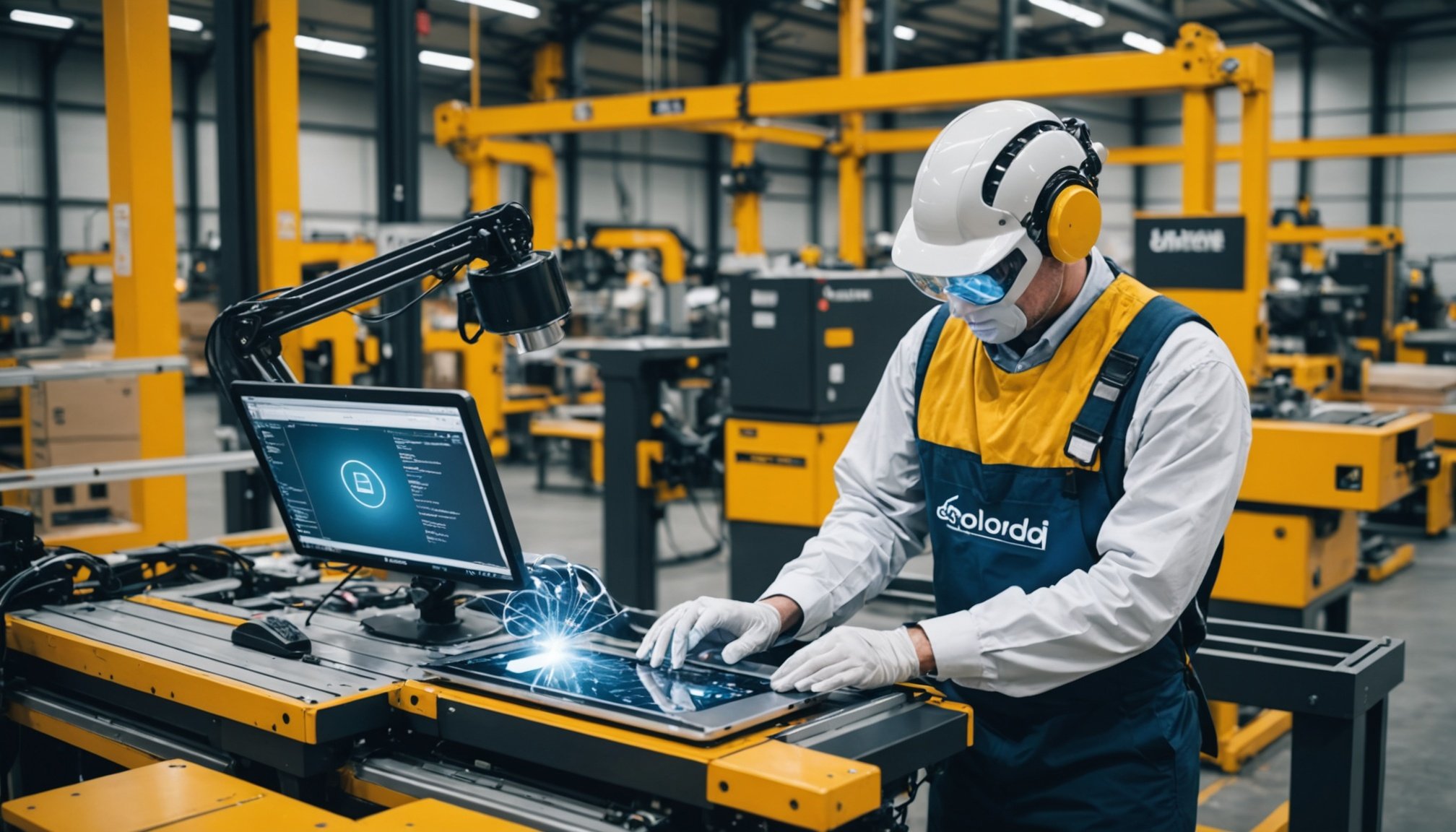Overview of AI in Supply Chain Management
The integration of AI supply chain management has revolutionised the way industries function. For UK SMEs, this technological influx comes at a critical time when efficiency and adaptability are paramount. Automation and data analytics are top priorities, significantly influencing the speed and precision of supply chains. Leveraging AI means constantly staying abreast of technology trends.
In the current landscape, AI technologies are enhancing supply chains across the UK by providing key insights and driving performance improvements. These advanced systems enable businesses to make confident operational decisions and adapt swiftly to market demands. Among the benefits, AI supply chain management offers predictability, resulting in fewer disruptions and more agile processes.
Also read : Transforming Multi-Site Projects: Key IoT Strategies for UK Construction Firms
For UK SMEs, adopting AI is not merely a trend but a necessary evolution. It fosters opportunities for growth by streamlining operations and increasing productivity. With AI, businesses achieve better resource allocation and reduced waste, ultimately enhancing profitability.
Small to medium-sized enterprises that have embraced AI report noticeable improvements in efficiency and customer satisfaction. This transformation, propelled by intelligent solutions, is setting the stage for future innovations, showcasing the crucial role AI plays in contemporary supply chain management.
Also to read : Elevate Inventory Management: Cutting-Edge AI Techniques for Retailers in the UK
Innovative AI Strategies for SMEs
Small businesses are currently at the forefront of transforming their operations by adopting AI strategies. Among these innovations, predictive analytics plays a crucial role. By harnessing the power of AI, businesses can gain deep insights into market demands, enabling them to forecast inventory needs accurately. This leads to significant cost savings by reducing excess stock and mitigating shortages. A classic example is a small apparel retailer using predictive analytics to anticipate seasonal fashion trends, aligning stock levels with customer demand efficiently.
AI-powered logistics management is another revolutionary strategy, enhancing supply chains by optimizing delivery routes and visualizing logistical processes comprehensively. Businesses report marked improvements in delivery times and cost efficiency by implementing AI-based solutions. For instance, a local delivery company significantly cut fuel costs by using AI to map the most efficient delivery paths.
In terms of machine learning for risk management, this AI strategy assists SMEs in identifying potential supply chain disruptions. By utilising machine learning models, these businesses can adapt swiftly to market changes and maintain operational continuity. Success stories abound, with SMEs leveraging AI to predict and navigate market fluctuations, underscoring the transformative potential of AI in modern supply chain optimization.
Practical Tips for Implementing AI in Supply Chains
Implementing AI strategies is a transformative step for SMEs towards enhanced supply chain optimization. To start, assessing organisational readiness is crucial. Consider these steps:
- Evaluate current operations and identify areas ready for AI integration.
- Opt for cost-effective AI tools and platforms specifically designed to cater to small businesses. These tailored solutions help maximise resources without straining finances.
Training and change management are vital components. Conduct thorough training sessions to ensure all employees are well-versed in AI applications, enhancing operational consistency. Change management requires clear communication regarding the impending shifts AI will introduce, easing staff apprehensions and ensuring smooth transitions.
Start with pilot projects. Implement AI in controlled scenarios to gauge impacts and fine-tune applications before full-scale rollouts. This approach reduces risks and helps identify necessary adjustments early. Additionally, foster a culture of continuous learning where staff can share insights and innovations related to AI usage.
Tailored approaches, strategic planning, and the right mindset are essential for successful AI implementation in SMEs. These elements collectively enhance supply chain efficiency, driving competitive advantage and preparing businesses for future technological advancements.
Challenges and Solutions in Adopting AI
Adopting AI technologies for supply chain management presents numerous AI challenges for UK SMEs. A frequent barrier is the high initial cost of AI solutions, which can strain financial resources. Additionally, SMEs often encounter a lack of technical expertise, impeding their ability to implement and operate AI systems effectively. To counteract these obstacles, practical solutions are crucial.
One approach is collaborating with technology providers who offer customised and affordable AI tools tailored for small businesses. This collaboration can lead to more manageable financial investments and greater accessibility of AI technologies. Further, engaging in training programs can equip SMEs with the necessary skills, enabling them to utilise AI technologies more efficiently and confidently.
On the organisational level, fostering a culture that embraces technological change is vital. Encouraging industry collaboration and building support networks can also provide SMEs with the needed guidance and resources. These networks often serve as valuable platforms for sharing experiences and practical solutions to common challenges.
Ultimately, by implementing these solutions, SMEs can overcome barriers, harness AI’s full potential, and drive supply chain innovations, positioning themselves effectively within the competitive market landscape.
Case Studies of AI in UK SMEs
Exploring case studies provides valuable insights into how AI impact is shaping the supply chains of UK SMEs.
Case Study 1: Retail Sector
In the competitive retail sector, a UK SME leveraged AI to refine its supply chain. AI tools enabled the business to track and analyse consumer behaviour, resulting in more precise stock levels. Key metrics showed a 20% improvement in turnover and a 30% reduction in overstock. These enhancements not only increased profitability but also heightened customer satisfaction.
Case Study 2: Manufacturing Sector
A SME in manufacturing integrated AI strategies by automating key operations. Specific AI applications focused on predictive maintenance, reducing machine downtime by 25%. This development led to a notable increase in production efficiency, proving the transformative power of AI.
Case Study 3: Distribution Sector
In the distribution sector, a SME improved operations dramatically through AI applications. With AI, they mapped efficient delivery routes, cutting delivery times by 15%. This operational change not only improved logistics but also bolstered community satisfaction by faster deliveries.
These case studies highlight the significant benefits and real-world success stories of AI in addressing specific SME obstacles in supply chain management.
Future Trends in AI and Supply Chain for SMEs
AI supply chain innovation is accelerating, with future trends set to further transform UK SMEs. Emerging technologies such as blockchain integration, IoT-enabled sensors, and AI-driven robotics are promising game-changers. These innovations will enhance supply chain management by boosting transparency, improving tracking accuracy, and automating routine tasks.
Looking ahead, adopting AI supply chain management will be pivotal for UK SMEs to remain competitive. The evolution of AI presents unprecedented opportunities for process refinement and cost reductions. For instance, blockchain ensures secure, transparent transactions, which simplifies auditing and compliance. IoT sensors offer real-time data, optimising inventory levels and reducing waste, while AI-driven robotics automate warehouse operations, expediting delivery.
Technology trends forecast a rise in AI’s role in supply chain innovations. SMEs should actively monitor these trends to adapt quickly. Embracing these technologies is integral to strategic planning, aligning SMEs with evolving market demands and preparing them for future challenges.
By leveraging impending AI developments, SMEs can maintain resilience and agility, ensuring long-term growth and sustainability. Investing in technology will not only meet current needs but will also fortify SMEs against future disruptions in the supply chain landscape.











